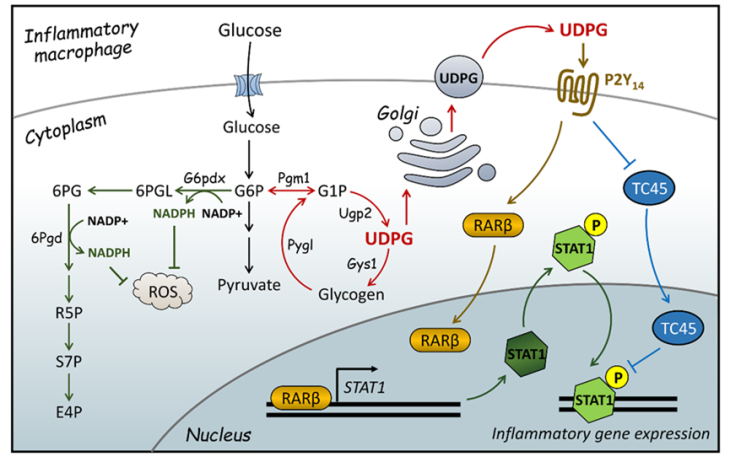Dr Bo Huang’s team reveals that glycogen metabolism regulates inflammatory macrophage formation
Source:Huafeng Zhang
2020-04-28
On April 14, nature communications published the latest research article titled "glycogen metrology regulations macrophage mediated acute inflammatory responses" from the team of Prof. Bo Huang. They found that glycogen was strikingly increased in the inflammatory macrophages. Glycogen metabolism not only maintains the survival of macrophages, but also regulates the inflammatory activation of macrophages by using UDPG as the core signal molecule. This is another study after two articles on glycogen metabolism of immune cells published in nature cell biology in 2018 and 2020.
Macrophages are one of the most important types of immune cells. They are involved in a variety of major diseases, including not only tumors, cardiovascular and cerebrovascular diseases, obesity and diabetes, but also various autoimmune diseases and infectious diseases. Although inflammatory macrophages play a crucial role in phagocytosis and eliminating bacteria, uncontrolled activation of inflammatory macrophages may trigger systemic inflammatory response syndrome (SIRS) or even sepsis, andcytokine storm in CAR-T cell therapy and SARS-CoV-2 infection. Therefore, precise regulation of inflammatory macrophages is of paramount importance in guaranteeing microbial clearance, injury limitation and avoidance of serious side effects, but the key regulatory point of the initiation of inflammatory activation of macrophages has not been found.
Glycogen is a polymer of glucose, which mainly exists in liver cells and muscle cells. For a long time, glycogen is only considered as a storage molecule of glucose and participates in energy metabolism. Huang’ previous studies have found that CD8+ memory T cells actively mobilize glycogen metabolism to generate glucose-6-phosphate (G6P) via glycogenolysis and channel the G6P to the PPP. In this metabolic model, the glycogen is not primarily used to store energy, but to provide antioxidant defense through the generation of NADPH and subsequently reduced glutathione. These findings imply that glycogen may exert important biological effects through metabolic pathways beyond its role as a reservoir of glucose. In support of this notion, UDP-glucose (UDPG), a glycogen metabolic intermediate, has been shown to act as a ligand for purigenic receptor P2Y14, thus directly triggering signal transduction.

In this study, they provide evidence that glycogen metabolism has a central function in controlling inflammatory pathways of macrophages by two related mechanisms: firstly, macrophages use glycolysis-derived G6P to synthesize glycogen, and subsequent glycogenolysis regenerates G6P which is channeled through the PPP to produce large amounts of NADPH required for inflammatory macrophage survival; secondly, glycogenesis-derived UDPG activates the P2Y14 receptor, whose signaling transduction regulates the inflammatory phenotypes of macrophages in an autocrine fashion. Therefore, they identify a previously unknown key metabolic pathway that fundamentally regulates the inflammatory phenotype of macrophages, which provides novel strategies against inflammatory diseases.
This work was completed by Huang’s team and supported by the National Natural Science Foundation of China and the Chinese Academy of Medical Sciences Medical and Health Technology Innovation Project.
Links: https://www.nature.com/articles/s41467-020-15636-8#Sec35
Macrophages are one of the most important types of immune cells. They are involved in a variety of major diseases, including not only tumors, cardiovascular and cerebrovascular diseases, obesity and diabetes, but also various autoimmune diseases and infectious diseases. Although inflammatory macrophages play a crucial role in phagocytosis and eliminating bacteria, uncontrolled activation of inflammatory macrophages may trigger systemic inflammatory response syndrome (SIRS) or even sepsis, andcytokine storm in CAR-T cell therapy and SARS-CoV-2 infection. Therefore, precise regulation of inflammatory macrophages is of paramount importance in guaranteeing microbial clearance, injury limitation and avoidance of serious side effects, but the key regulatory point of the initiation of inflammatory activation of macrophages has not been found.
Glycogen is a polymer of glucose, which mainly exists in liver cells and muscle cells. For a long time, glycogen is only considered as a storage molecule of glucose and participates in energy metabolism. Huang’ previous studies have found that CD8+ memory T cells actively mobilize glycogen metabolism to generate glucose-6-phosphate (G6P) via glycogenolysis and channel the G6P to the PPP. In this metabolic model, the glycogen is not primarily used to store energy, but to provide antioxidant defense through the generation of NADPH and subsequently reduced glutathione. These findings imply that glycogen may exert important biological effects through metabolic pathways beyond its role as a reservoir of glucose. In support of this notion, UDP-glucose (UDPG), a glycogen metabolic intermediate, has been shown to act as a ligand for purigenic receptor P2Y14, thus directly triggering signal transduction.

In this study, they provide evidence that glycogen metabolism has a central function in controlling inflammatory pathways of macrophages by two related mechanisms: firstly, macrophages use glycolysis-derived G6P to synthesize glycogen, and subsequent glycogenolysis regenerates G6P which is channeled through the PPP to produce large amounts of NADPH required for inflammatory macrophage survival; secondly, glycogenesis-derived UDPG activates the P2Y14 receptor, whose signaling transduction regulates the inflammatory phenotypes of macrophages in an autocrine fashion. Therefore, they identify a previously unknown key metabolic pathway that fundamentally regulates the inflammatory phenotype of macrophages, which provides novel strategies against inflammatory diseases.
This work was completed by Huang’s team and supported by the National Natural Science Foundation of China and the Chinese Academy of Medical Sciences Medical and Health Technology Innovation Project.
Links: https://www.nature.com/articles/s41467-020-15636-8#Sec35


